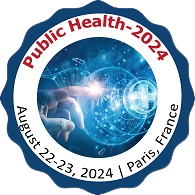Call for Abstract
Scientific Program
7th European Conference on Public Health, Well-being and Healthcare Management, will be organized around the theme “Wellness Revolution: Innovations in Public Health and Healthcare Management”
Public Health-2024 is comprised of keynote and speakers sessions on latest cutting edge research designed to offer comprehensive global discussions that address current issues in Public Health-2024
Submit your abstract to any of the mentioned tracks.
Register now for the conference by choosing an appropriate package suitable to you.
Epidemiology: Understanding Disease Patterns
Epidemiology is the study of the distribution and determinants of diseases in populations. It helps us answer critical questions about diseases, such as:
Disease Occurrence: Epidemiologists investigate how often diseases occur in a given population, looking at factors like incidence (the number of new cases) and prevalence (the total number of cases) to understand the disease burden.
Disease Spread: They examine how diseases spread through populations, considering factors like transmission routes (e.g., person-to-person, vector-borne), incubation periods, and the basic reproduction number (R0) to predict outbreaks.
Risk Factors: Epidemiologists identify risk factors that increase the likelihood of disease, such as genetics, lifestyle, environmental factors, and socioeconomic status.
Protective Factors: They also seek protective factors that reduce disease risk, helping to inform preventive strategies.
Disease Outcomes: Epidemiology investigates the outcomes of diseases, including morbidity (illness) and mortality (death), to assess the impact on public health.
Disease Surveillance: Monitoring and Control
Disease surveillance is the ongoing, systematic collection, analysis, interpretation, and dissemination of data related to diseases. It serves several critical purposes:
Early Detection: Surveillance systems monitor trends in diseases and detect unusual patterns or outbreaks early, allowing for a rapid response to contain and control them.
Data Collection: Health agencies gather data from various sources, including healthcare facilities, laboratories, and even social media, to create a comprehensive view of disease patterns.
Risk Assessment: Surveillance data help assess the risk posed by diseases, guiding public health interventions.
Resource Allocation: Governments and healthcare organizations use surveillance information to allocate resources efficiently, ensuring that areas with higher disease burdens receive appropriate support.
Evaluation of Control Measures: Surveillance helps assess the effectiveness of interventions, such as vaccination campaigns or quarantine measures

